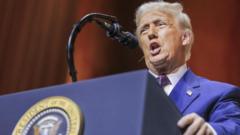In a strategic move to address U.S. tariff concerns, Mexico has dispatched 10,000 National Guard personnel to the U.S.-Mexico border, aimed at combating drug smuggling, particularly fentanyl. The action is part of a deal expected to delay the imposition of steep tariffs by the Biden administration, emphasizing the ongoing collaboration between the two nations amidst economic pressures.
Mexico Boosts National Guard Presence at U.S. Border Amid Tariff Negotiations

Mexico Boosts National Guard Presence at U.S. Border Amid Tariff Negotiations
Claudia Sheinbaum's government reallocates resources to tackle drug trafficking and concession to avoid tariffs.
The Mexican government, led by President Claudia Sheinbaum, announced the deployment as a necessary measure to ensure border security and reduce the flow of illegal drugs into the United States. The National Guard, established recently and now under military command, faces increased responsibilities at the border, a region lacking a dedicated border patrol due to restrictions on arming immigration officers.
Security experts, such as Jonathan Maza, acknowledge Mexico's reliance on the National Guard in addressing recent immigration and narcotics trafficking issues, a trend initiated by previous president Andrés Manuel López Obrador in 2019. The current surge in personnel will draw resources from other regions within Mexico and is not without its critics, as details surrounding the cost and logistical implications of this strategy remain unspecified.
With 130,000 National Guard members now tasked with managing cross-border issues, the effectiveness of this deployment will be closely watched by both the Mexican government and U.S. officials, who are keen on reducing drug-related violence and illegal immigration.
Security experts, such as Jonathan Maza, acknowledge Mexico's reliance on the National Guard in addressing recent immigration and narcotics trafficking issues, a trend initiated by previous president Andrés Manuel López Obrador in 2019. The current surge in personnel will draw resources from other regions within Mexico and is not without its critics, as details surrounding the cost and logistical implications of this strategy remain unspecified.
With 130,000 National Guard members now tasked with managing cross-border issues, the effectiveness of this deployment will be closely watched by both the Mexican government and U.S. officials, who are keen on reducing drug-related violence and illegal immigration.





















